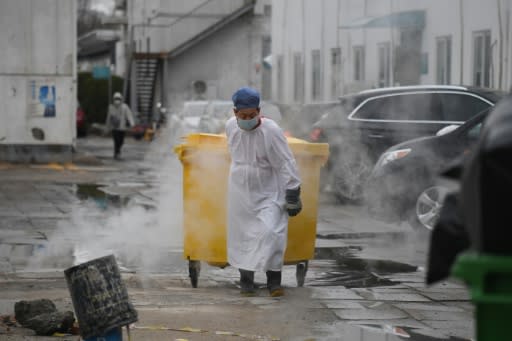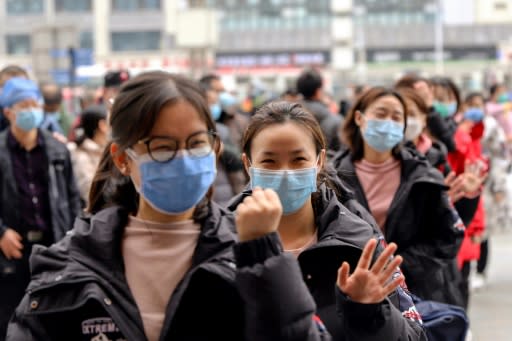China virus death toll nears 1,400, six health workers among victims
The death toll from China's virus epidemic neared 1,400 on Friday with six medical workers among the victims, underscoring the country's struggle to contain a deepening health crisis. Nearly 64,000 people are now recorded as having fallen ill from the virus in China, with officials revealing that 1,716 health workers had been infected as of Tuesday. The grim figures come a week after grief and public anger erupted over the death of a whistleblowing doctor who had been reprimanded and silenced by police after raising the alarm about the virus in December. The scale of the epidemic swelled this week after authorities in central Hubei province, the epicentre of the crisis, changed their criteria for counting cases, adding thousands of new patients to their tally. The health emergency in China has caused fears of further global contagion, with more than two dozen countries reporting hundreds of cases among them. Egypt reported its first case on Friday, the first in Africa. Three people have died outside mainland China. The majority of cases of infections among health workers was in Hubei's capital, Wuhan, where many have lacked proper masks and gear to protect themselves in hospitals dealing with a deluge of patients. "Our understanding is that the cases among health workers peaked in the third and fourth week of January," said Michael Ryan, head of the World Health Organization's health emergencies programme. Speaking to reporters in Geneva on Friday, Ryan added that there had been a "rapid fall-off" in such cases over the last two weeks. After the death of whistleblower Li Wenliang, a 34-year-old ophthalmologist in Wuhan, 10 academics circulated an open letter calling for political reform and freedom of speech in the Communist-ruled country. Under criticism over the handling of the crisis, the Communist Party sacked two top-ranking officials in Hubei, replacing them with senior cadres with security backgrounds. Battling the epidemic is a "big test for the country's governance system and governance ability," Chinese President Xi Jinping said as he chaired a political meeting on government reforms, according to state broadcaster CCTV. The outbreak has exposed "shortcomings," Xi acknowledged, adding that China needed to reform its public health and epidemic prevention and control systems. - New count - Authorities in Hubei had on Thursday started counting patients who were "clinically diagnosed" via lung imaging, in addition to those who undergo lab tests. The revision added nearly 15,000 patients to Hubei's count in a single day, with officials explaining that past cases were included. On Friday, Hubei's health commission said another 116 people had died and more than 4,800 new cases were reported. Of those cases, more than 3,000 were "clinically diagnosed". The WHO said the numbers included cases going back weeks. The sharp one-day increase "does not represent a significant change in the trajectory of the outbreak," said Ryan. The move will ensure patients get treated as early as possible, instead of having to wait for laboratory tests, health officials said. "There have been some backlogs in testing and this is also going to help in ensuring that people get adequate care," Ryan said. The National Health Commission said the new criteria would only apply to Hubei. The commission reported five other deaths and 217 new cases elsewhere in China, as the number of new patients outside Hubei fell for a 10th straight day. It also disclosed a statistical error, saying it removed 108 previous deaths in Hubei that had been double-counted. The nationwide toll still rose to 1,380. Authorities have placed some 56 million people in Hubei under quarantine since late last month, in an unprecedented effort to stop the virus from spreading. Some cities in Hubei tightened restrictions this week, sealing off neighbourhoods in what they liken to "war-time" measures. - US criticism - While the WHO has praised China's handling of the epidemic -- in contrast to its cover-up of the SARS outbreak in 2002-2003 -- a top White House official on Thursday said Beijing should be more open. "We're a little disappointed in the lack of transparency coming from the Chinese," Larry Kudlow, the director of the National Economic Council, told reporters. Kudlow said Xi had assured President Donald Trump that Beijing would accept US help, but "they won't let us". Kudlow's comments contrasted with Trump's apparent confidence in China -- he told a radio show that Xi is "extremely capable" and that the US was "working with them" and "sending a lot of people". Chinese foreign ministry spokesman Geng Shuang said Beijing has had an "open and transparent attitude" with the global community since the start of the epidemic, and exchanged epidemic information with the US side in a "timely manner". Several countries have banned arrivals from China, while major airlines have halted flights to and from the country. In Singapore, which has 67 confirmed cases, the Roman Catholic Church said it was suspending all masses indefinitely to help prevent the spread of the virus. Archbishop William Goh urged the faithful to follow services on YouTube or the radio. And in the sports world, European Tour chiefs have postponed the Maybank Championship in Malaysia and the China Open in Shenzhen -- the latest events to fall victim to the outbreak. People wearing protective facemasks queue to order food in Shanghai -- the scale of the novel coronavirus epidemic has swelled after authorities in central Hubei province, the epicentre of the contagion, changed the criteria for counting cases Countries or territories with confirmed cases and total deaths from the new coronavirus (COVID-19) A worker carts a bin loaded with medical waste to a storage facility at the Youan Hospital in Beijing, which is treating coronavirus patients Medical staff leave for Wuhan from Nanchang in China's central Jiangxi province A man walks through an almost deserted Los Angeles Chinatown as most stay away due to fears over the novel coronavirus






